Best Startups to Invest In: Key Factors for an Angel Investor
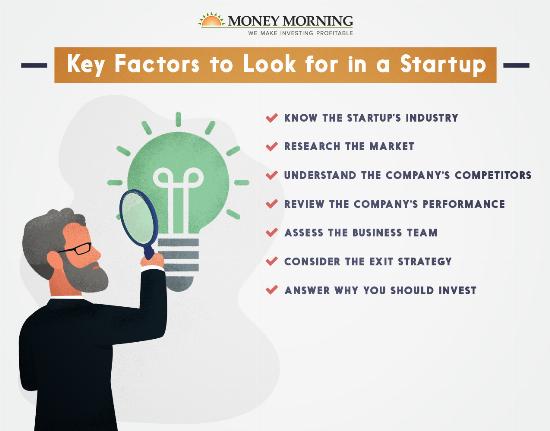
Finding the best startups to invest in requires you to do your due diligence as an angel investor.
This way, you can determine the types of startups to consider as well as identify the best startup companies to invest in that will yield the best results.
In this article, we'll examine the key factors involved with investing in startup companies.
Whether you want to invest in tech startups or other types of businesses, this article will explore what you'll need to know when it comes to finding the best startups to invest in.
Seven Factors of Finding the Best Startups to Invest In
About 90% of startups do not achieve successful gains, putting their investors at possible risk for not getting their money back.
On the bright side, the successful 10% of startups usually generate enough return on investment to make up for the losses of others and then some. This is why angel investing is one of the most enticing ways to grow your investment portfolio.

But selecting the best startup companies to invest in isn't easy.
To get you started, we've evaluated the key elements that angel investors must consider when reviewing startup investment opportunities.
And we've identified seven key factors that play a role in whether an angel investment turns into a boom or bust:
- Know the startup's industry.
- Research the company's market.
- Understand its competitors.
- Review the business's performance.
- Assess the startup's leaders.
- Consider your exit strategy.
- Answer why you're investing.
Know the Industry
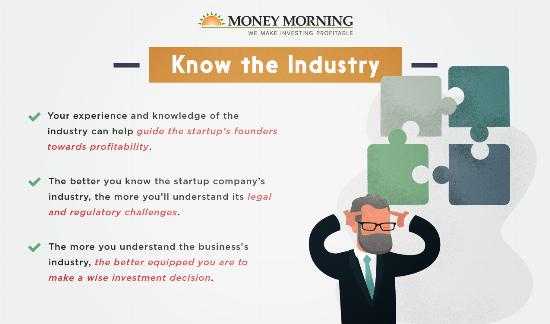
A pivotal part of angel investing is knowing or learning more about the industry in which the types of startups you invest in operate.
There are many aspects for you to consider with regard to how a company is run when deciding whether or not to invest. The more you understand the business's industry, the better equipped you will be to make wise investment decisions.
Plus, oftentimes, a startup's leadership team may need guidance as it grows.
If you are an expert, have experience, or are well connected in the startup's industry or field, you may be able to assist by providing direction and recommendations to help guide its founders and steer the company toward profitability. You might even be able to open doors for the business that would otherwise be closed if not for your network of contacts and rapport with others in the industry.
And the better you know the startup company's industry, the more you'll understand its legal and regulatory challenges.
Many startups aim to carve a space for themselves in new or evolving areas, which may lead to legal hurdles. An excellent example of this evolution can be seen in the onset of new companies within the U.S. cannabis industry, which is growing alongside a developing regulatory framework.
Research the Market

On par with a company's industry is its market.
While a startup's industry is the space in which it operates, the company's market is comprised of its potential and prospective customers.
How many people or businesses are willing to pay for what the company's selling? The answer to this question is essential to determining a startup company's likelihood of success.
It's often impossible to know the exact size of a startup's potential market. For example, no one knew how many people would be willing to pay for ridesharing when Uber and Lyft first started.
Still, as an angel investor, it is imperative for you to study the startup's market as much as possible in order to make educated predictions.
Another piece to researching a startup business's market is being able to identify the issue the company is addressing or solving, and for whom.
Some angel investors passed on Uber when the company first solicited investment because they didn't think the startup was solving a realistic problem faced by enough people. To these investors, ridesharing was trying to solve a problem that taxicabs already addressed.
Uber's founders suspected that the taxi industry lacked the technology increasingly expected by consumers who relied on smartphones for everyday transactions. The ridesharing company filled this gap that some angel investors didn't see by making it easy for urban professionals to book a ride by a few simple clicks on a mobile app.
Understand the Company's Competitors
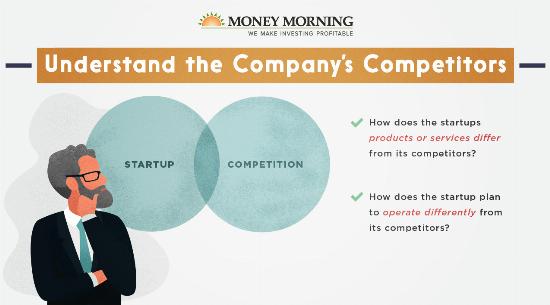
Along with identifying a startup's potential customers, you'll want to understand its competitors and their offerings.
Reviewing a competitive analysis is important as you'll need to know how the startup is marketing itself and its offerings to target customers in relation to efforts done by its competitors. Additionally, you'll want to examine how well it is differentiating itself from its competitors.
For example, let's say you were an angel investor considering investing in Uber during its early days. There may be a good possibility of you questioning the investment once you take into consideration all the taxis fulfilling a patron's on-the-go transportation need in cities around the world.
But if you considered the sometimes-frustrating process of hailing a cab, you may have deemed Uber to be on to something. After all, why would someone stand outside in the elements, trying to wave down a passing car, when they could easily and conveniently stay indoors and use their smartphone to book a ride to their destination?
When evaluating the best startups to invest in, you'll want to evaluate each of the startup's competitors. Make sure to consider all the aspects of how these competitors do business, their successes or misses, how their offerings are similar, and how the startup proposes to do things better or differently.
The latter, how a startup plans to operate differently from its competitors, is the foundation for its competitive advantage.
If you believe that this competitive advantage could lead to success, the startup may very well be worth your investment.
Review the Company's Performance
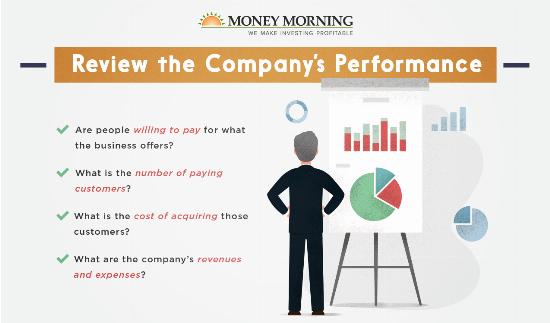
Seeing how a company performs is a necessary part of finding the best startup companies to invest in.
Here are some items to consider when reviewing a startup's performance:
- Number of customers
- Cost of acquiring those customers
- Expenses and revenue
Perhaps the single most important metric that indicates a startup's potential success is if it has enough of a market willing to pay for what it offers. Note that this can be true even if the number of paying customers is small.
Some early-stage companies may have only a handful of customers who've paid for the business's products or services. This can be a powerful indicator on whether or not the startup is solving a viable problem or filling in a much-needed gap.
You'll also want to explore the amount of money the company is spending to acquire a paying customer, which is called the customer acquisition cost.
For example, if a company spends $10 for advertising a product that produces a profit of $4, the startup is losing $6 per transaction.
This doesn't automatically mean the startup is a not a sound investment. Sometimes, especially in a company's early days, a business needs to spend more money (up front) to acquire new customers by building brand awareness and by investing in marketing and advertising campaigns to generate qualified leads and grow its customer base.
That said, it's recommended that you factor in a company's customer acquisition costs before making your final decision.
Additionally, it is recommended for you to look at a startup's balance sheet and review its revenue and expenses. It's helpful to know how much the company is spending and how much money it has in the bank. Determine how much the business's founders are paying themselves, any overhead costs, as well as the company's other expenses.
Assess the Business's Team
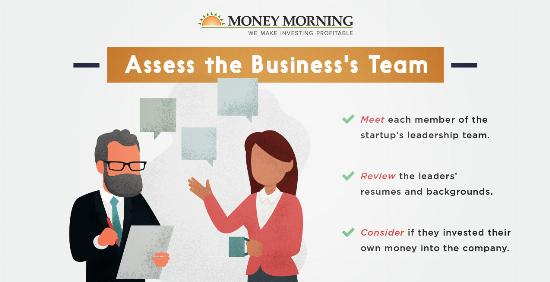
Speaking of the business's founders, a startup's leadership team is integral to its chances of success.
Meet each member of the leadership team. Ask them questions about the company, its industry, its competitors, and their growth plan.
Review the leaders' resumes, areas of expertise, and professional background. Do they have substantial experience in the industry or field? Have they experienced adversity in the past? If so, how did they respond? Do they have exemplary leadership experience?
Running and growing a company has its challenges. The more adept and experienced a startup's leaders are, the more likely they are to steer the business toward a profitable path.
When learning about a startup's founders, another element to keep in mind is whether they've invested any of their own money into the company.
It may not be a deal-breaker for you if they haven't, but it's something to consider because founders who've invested in their startups may be more motivated to grow the business.
Consider the Exit Strategy
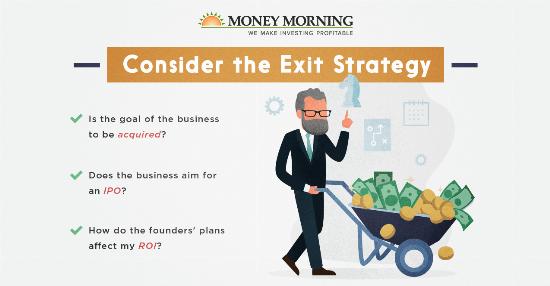
A proper exit strategy is key to your investment decision - it's important to think about how you'll eventually get your money back and when.
Keep in mind that some angel investments take a while to generate returns for their investors.
It took Google six years from its founding to launch its initial public offering, which ultimately generated billions for its early investors.
When considering a startup, ask its leadership team what success looks like to them. Determine whether they are planning to build a business with the intent of it being acquired by another company. Or, perhaps its goal is geared toward long-term growth to become a self-sustaining and profitable business.
The founders' plans can help you dictate when or if you receive a return on your investment. Whatever their approach, be sure to note when they anticipate to pay you back for your investment.
Remember: Your goal in angel investing is to make money. Think about how and when that will happen as you're considering the best startups to invest in.
Answer Why

Above all else, when deciding the best startups to invest in, know your reason(s) for investing in the first place. Keep in mind why you want to and why you should invest in this company.
Perhaps you're passionate about the problem the company's aiming to solve.
Or perhaps you've found yourself so completely impressed by the startup's founders that you believe they'll make the most of your investment. Or maybe you think the market potential is too promising to ignore, such as the emerging cannabis industry.
Whatever your reasons may be, it's your money and ultimately your decision.
One way to determine the best startup companies to invest in is to check in with yourself to ensure you feel good about where you're putting your money.
Getting Going with Angel Investing
Whether you want to invest in tech startups or other types of businesses, exploring each of these factors will help you find the best startup companies to invest in.
Check out our complete guide to angel investing to learn more about how to become an angel investor, discover the types of startup investors, or see examples of angel investors. You'll also find out how to identify startup companies to invest in, walk through the angel investor exit strategy, and learn about angel investment opportunities.
Think you're ready to get started as an angel investor? The Angels & Entrepreneurs Network is an excellent place to begin. This platform makes angel investing more accessible to investors like you!


